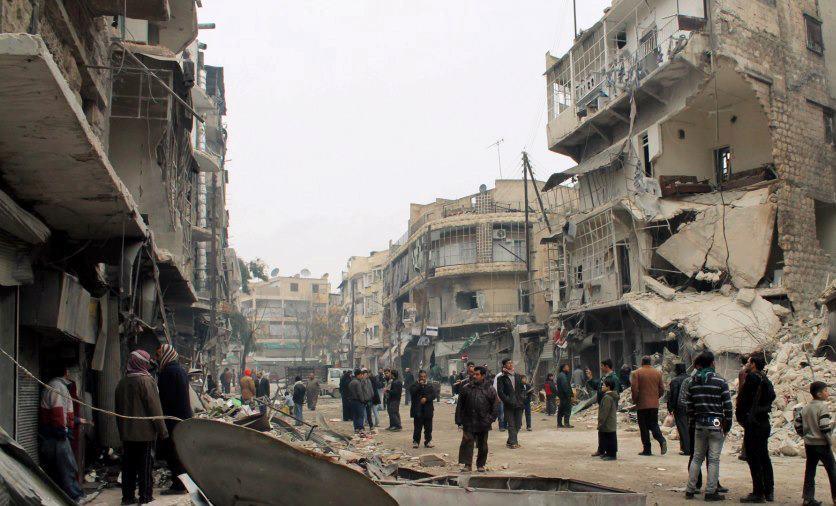
Destruction in Aleppo, Syria. Photograph by Syrian Commando
Standing on the front lines in Aleppo you can’t just smell the gunpowder, you can smell the depression. It hangs in the air far thicker than smoke, and with far worse effects. The fighters have a hard time seeing through it but they push forward anyway, having no choice.
“Should we have started this revolution? I don’t know,” a Free Syrian Army (FSA) brigade commander said to me shortly after I arrived in Aleppo in October. I reassured him that the revolution was a good idea, that it had to be done and that they were not only fighting for their own freedom but for the freedom of millions around the world who would be inspired by their example.
But he wasn’t convinced. With solemn acceptance of his fate he simply replied, “We will fight or we will die. We have no choice now.”
I had just come from a cheerleader revolution in Libya. We who fought in the Libyan revolutionnever doubted the righteousness or eventual success of our cause, we never questioned our path forward. In early March, before I was captured by Gaddafi’s forces — before NATO got involved in the war — we were certain of victory. Sure, not many went to the front lines and many men just stood by waiting for Gaddafi to wipe us out, but those of us who did go to the front lines, who had the courage to fight Gaddafi’s modern army with our AK-47s and DShK machineguns knew, in both our minds and our hearts, that we would somehow win.
In hindsight, we were overconfident. I was captured a week before NATO joined the war and had it not been for NATO we would still be fighting in Libya and I would still be in prison. We had underestimated the number of people who would actually fight for Gaddafi and how hard they would fight. Even with NATO air support it took eight months to win the war; without NATO the war in Libya could have lasted years.
But we weren’t wrong in our hearts and, even at the worst times, when watching comrades die and taking fire so heavy that you prayed under your breath knowing that any moment could be your last, we didn’t waiver in our resolve. Our morale was high, most of the Libyan people openly supported us, wartime propaganda was vibrant and, perhaps most important, we knew that the world was with us.
Hearing a Syrian FSA brigade commander question everything was a shock to my system. I thought he was joking and I smiled. But my smile quickly faded when I realized he was serious, and part of me wanted to walk over to him, grab him by the collar, and shout at him about the 60,000 who had died and how disgraceful it was, a betrayal really, that a FSA commander would ever express such doubts about the revolution. Not in a mean way, that’s not in my nature, but just harsh enough to try to shock him back to reality.
But I didn’t. It wouldn’t be his reality I would be shocking him back to, it would be mine. The Syrian revolution is far different than Libya. Now I know what it feels like to be on the losing side, to be on the receiving end of artillery and aerial bombardment, and to not have the overwhelming, unwavering support of the people behind you.
This man had plenty of reasons to be depressed. He was echoing the sentiment of many in the FSA, a recurring theme during my month on the front lines. “Why has the world abandoned us to die?”
And I didn’t have a good answer for them.
So I spent a month making excuses when asked this gut-wrenching question. I blamed their abandonment on international diplomacy, on the U.S. elections, on Russia. I made up convoluted explanations involving arms sales to the Assad regime and maneuvering at the United Nations, American politics and anything else I could think of. But they knew, and I knew, that I didn’t have the answers this time. Here I was, falling asleep and waking up to the sound of aircraft bombing us, stepping in the blood of dead civilians being dragged into the hospital daily and watching fighters carefully reload their AK-47 magazines with bullets — $2 each — that couldn’t reach the aircraft, couldn’t penetrate the tanks and couldn’t find the snipers.
I could tell them nothing. Certainly not the truth. Yes, the world has abandoned you to die, for your families to be imprisoned, for your women to be raped. And not just the women, as the Syrian army is fond of raping men, women, and children, and sometimes making the family watch while they do it. Videos have emerged of the Syrian army allegedly cutting heads off with chainsaws andburying people alive, but none of this shocks Syrians nearly as much as watching an American president talk about the horrors of Syria, yet do nothing to help them.
It is uncomfortable for an American, a proud American, to be put in the position of making excuses for his country. You feel defensive, and disloyal if you acknowledge the validity of the criticisms. Sometimes you get quietly angry about it, but you aren’t sure if you’re angry at the Syrians, your government, or yourself. It is hard to defend the indefensible, especially when you agree with the Syrians’ criticisms, but you try because it’s still your country and despite America’s abandonment of the Syrian people, it is still the one country on Earth that has done more for freedom than any other in history.
Syrians know this will be a long war. Most still believe in victory, but many know that victory is a distant dream that could take years to achieve. History is not on the side of expediency — civil wars through history have lasted an average of seven to fifteen years and the Lebanese Civil War (Syria’s neighbor with a similarly sectarian population) was one of those that lasted fifteen.
The fact is, the Syrian Civil War is just getting started. Assad may fall in the next few years, perhaps faster with Western support or another dramatic development, but the war after the war could rage for several years more.
But none of this matters, and it certainly doesn’t matter to that FSA commander who is questioning the revolution. These are academic discussions which belonged in the room when the decision to revolt was being made. It doesn’t matter now, there is no going back and the only path forward is victory at any cost.
“We will fight or we will die. We have no choice now.” He’s right.
Written by Matthew VanDyke




